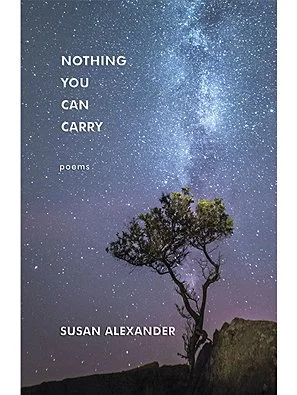REVIEWER: Wendy Donawa is grateful to live on the unceded territory of the Songhees and Esquimalt peoples, and to see the Salish Sea and the Sooke Hills from the window over her desk. Our Bodies’ Unanswered Questions is her second collection.
Poet Wendy Donawa
unpacking the poem:
Regional reviewers focus on regional poems
Reviewer Wendy Donawa unpacks a different poem every month. She examines the poem in a way she hopes is helpful for readers and other poets to understand how craft works in a particular poem, for a particular effect.
october 2022: Susan Alexander
Sword Ferns in Spring
If you stop
(waist high hemmed in on every side)
and the wind stops
and the winter wrens quit
their frantic love trills, you may hear
a sound galactic—
how fractals unfurl in Fibonacci spirals,
how each frond learns those intervals,
sings variations on the theme.
Treble and bass clefs tip
fresh growth, trembling
along the staffs of winter veterans.
Golden cochleae listen for harmonies.
Tomorrow they will play the tune.
All winter they have endured for this.
The dead and the seasoned circle
new geometry.
Every year you must come
join the chorale, faithful and primordial.
Even you,
with your fretful grace note.
Poet Susan Alexander
Susan Alexander is the author of two collections of poems, most recently Nothing You Can Carry. Susan’s poems appear in anthologies and magazines in Canada and internationally. Her awards include the Vancouver City Poem Contest, 2022, and the Mitchell Prize for Faith and Poetry. She lives on Nexwlélexm/Bowen Island, BC.
Unpacking “Sword Ferns in Spring”
At first glance, this poem offers a lyrical, acutely observed glimpse of an imagined reader (the “you” of the poem) “hemmed in” by sword ferns. But “If you stop” and move beyond the sounds of wind and birdsong, you might “hear/ a sound galactic.” In a few lines the poet brings us from a sensuous individual experience to life processes as huge as the Milky Way’s streaming galaxy.
The ferns weave a complex tapestry of images both sensual and spiritual, both miniature and boundless. The ferns’ unfurling is not random, but spaced in “Fibonacci spirals.”* We find these spirals embedded everywhere in nature: in the cross-section of a nautilus, in the tiny snail-shaped bone of our ear’s cochlea, in the spiralling Milky Way, and in the specific proportions of the unfurling fern. Its loops and coils “play the tune,” the “harmonies,” of the plant’s growth, maturation, and death.
Now the poem’s metaphors have become musical. If we listen for life’s harmonies, we will learn to “play the tune” that includes life’s inevitable harshness. “All winter they have endured for this.” Our acceptance of “the dead and the seasoned” is the life cycle we partake in.
Yes, you too, says the poem. “you, /with your fretful grace note.” A grace note is an extra, non-essential note added to music, just as the human species is one expression, but not an essential one, of creature-life on the earth.
We can, however, “join the chorale.”
*Fibonacci, a 12th century Italian mathematician, sought perfection of art and nature through a mathematical proportion of numbers.




